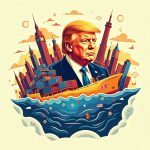The United States, known for the iconic Statue of Liberty and her enduring call to the world's "huddled masses yearning to breathe free," now finds itself embroiled in a paradox of border walls and immigration policies. The debate on illegal immigration has reached a crescendo under the leadership of Donald Trump, and the latest exploration by Peter Zeihan of Zeihan on Geopolitics, provides a compelling lens into the current state of affairs.
Zeihan, channeling insights from his recent YouTube discussion, sheds light on how Trump's approach, although intended to curb illegal immigration, might paradoxically encourage it instead. Let's delve into this complex and often contentious matter.
The United States: A Growing Tapestry of Immigrants
The landscape of immigration in America is vast and deeply entrenched. With an estimated 10 to 15 million undocumented immigrants, America is facing economic shifts, notably the doubling of its industrial capacity in preparation for a potential reduction of China's role in global trade. As blue-collar jobs rise, so does the need for a broader workforce. However, the influx of labor is intertwined with undulating views on immigration, making the waters murkier than the Mississippi during flood season.
The legacy of immigration in the US is one of ebbs and flows. Zeihan highlights this cyclical nature, illustrating how the business community has traditionally advocated for increased immigration to bolster the workforce. Yet, with political dynamics shifting, the business community finds itself in an uncertain position, no longer influencing immigration policies as they once might have.
The Nativist Moment and Its Economic Costs
As the United States wades through a "nativist moment," influenced heavily by the MAGA movement, questions arise: What economic price will America pay, and how achievable are these hardline immigration goals?
Trump's administration is known for policies that often project an ideology onto immigrant motives, which Zeihan suggests leads to flawed policies. Drawing parallels with historical figures like Mao Zedong, Zeihan warns against making broad assumptions about immigrant intentions, highlighting that data and government statistics support a narrative contrary to the one often assumed: immigrants are statistically less likely than citizens to commit crimes.
The Border Wall: A Barrier or a Trampoline?
In a twist that could be mistaken for poetic irony, the border wall championed by Trump might inadvertently be facilitating illegal immigration. While the wall cuts through natural barriers like the Sonoran and Chihuahuan deserts, the construction of access roads transformed previous impediments into passageways. As Zeihan aptly puts it, a simple ladder allows one to leverage these new roads and the barrier backfires as a trampoline, launching immigrants into opportunities for better lives.
A New Era of Deportation and Fear
One cannot ignore the visceral impact of the administration's focus on mass deportations. Zeihan shines a light on the costly, theatrical nature of such operations, famously using military jets akin to using a sledgehammer to crack a nut. Each deportation flight, Zeihan reveals, carries a staggering cost of approximately $6,000 per person—a price tag hard to justify when the actual number of deported criminals remains low.
The Industrial Imperative: Cities on the Brink
As America braces to expand its industrial plants, the implications of Trump's immigration policies ripple across various cities, including Houston, Phoenix, Atlanta, and beyond. These hubs, poised to become industrial powerhouses, are likely to welcome a notable concentration of migrant workers.
Yet, if these workers live in fear of deportation, unable to integrate due to legal barriers, they remain susceptible to exploitation and crime. By shutting out opportunities for legal status or cooperation with law enforcement, policies may turn cities into tinderboxes of unrest.
A Call for Human-Centered Policies
There lies an opportunity for the smarter play—a lot like opting for a "Choose Your Own Adventure" book where readers can muscle their way to the best outcome. By designing routes to legal status, even when citizenship isn't an end, America stands to gain from migrant contributions. This endeavor would lend a hand to cooperative engagement, facilitating safer communities and providing avenues for the undocumented to help curb crimes like cartel activities.
A Community-Carved Future
As the late Dr. Martin Luther King Jr. envisioned, the arc of history bends toward justice. Trump’s policies might feel like an echo from eras past, a persistent gesture toward distancing rather than dialogue. Yet, it is in embracing change, understanding the underlying human motivations, and crafting policies with empathy and pragmatism that we may find both balance and prosperity.
What are your thoughts on immigration and its influence on economic growth? Can America grow its industrial might while also maintaining humane and effective immigration practices? Join the conversation and become a part of the iNthacity: the "Shining City on the Web" by liking, sharing, and throwing a comment our way. Let's engage in the dialogue that shapes our shared future!
Wait! There's more...check out our fascinating short story that continues the journey: The Celestial Mirror
Disclaimer: This article may contain affiliate links. If you click on these links and make a purchase, we may receive a commission at no additional cost to you. Our recommendations and reviews are always independent and objective, aiming to provide you with the best information and resources.
Get Exclusive Stories, Photos, Art & Offers - Subscribe Today!

























Post Comment
You must be logged in to post a comment.